| Emigration (1938 - 1945) On 12 February 1938, Chancellor Kurt von Schuschnigg signed the Berchtesgaden Agreement with Nazi Germany, which paved the way for the end of Austria as an independent state. Alma and Franz Werfel heard the news on the island of Capri, where they had ended up during a trip to Italy lasting several weeks. 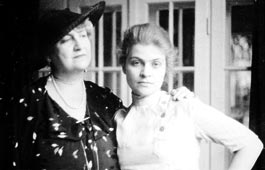 |  | 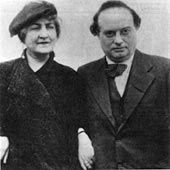 | | | | | | Alma with her daughter Anna Mahler in the villa on the Hohe Warte, 1933 | | Alma and Franz Werfel in New York, 1935 | At the end of February 1938, Alma travelled incognito and alone back to Vienna, where she closed all her bank accounts and arranged for the money to be smuggled into Switzerland by her long-time confidante, Ida Gebauer, known as "Schulli". On 12 March, the date of Austria's Anschluss to the Greater German Reich, she travelled with her daughter Anna who, being half Jewish, was now in danger, via Prague and Budapest to Milan, where Werfel was already waiting for her. 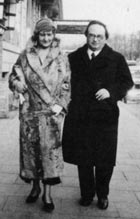 |  | 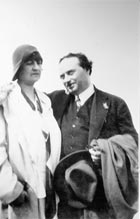 |  | 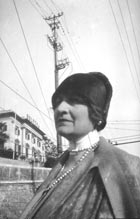 | | | | | | | | Alma and Werfel, 1937 | | Alma and Werfel 1933 | | Alma in Santa Margherita | The relationship between Franz Werfel and Alma Mahler-Werfel had not yet been re-cemented; in her diary, Alma wrote of "two people who, after 20 years together, speak two different languages", and whose "racial difference" could not be overcome. Nevertheless, the two settled in the southern-French fishing village of Sanary-sur-Mer near Marseilles where, until 1940, numerous emigrants such as Bertolt Brecht, Ludwig Marcuse, Thomas and Heinrich Mann, Lion Feuchtwanger and Ernst Bloch occasionally spent time. At this time, Alma Mahler-Werfel was considering divorce, and put out feelers through the Reich Propaganda Office to ascertain whether she would be welcome in Austria. The reason why she however decided to follow her Jewish husband into exile may lie in the fear which Alma had, aged now almost 60, of being alone 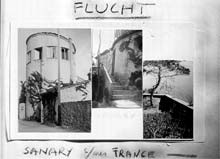 |  | 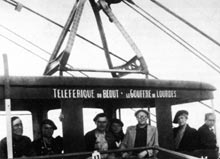 | | | | | | Moulin Gris, Alma and Werfel's
refuge in Sanary-sur-Mer, 1938 | | Alma (right) wearing a hat during a cable-car ride in Lourdes, 1940 | When, in June 1940, the couple left Sanary-sur-Mer, the German army had already occupied Paris. They did not have a visa for the United States and had to wait at the pilgrimage centre of Lourdes for five weeks in order to obtain permission to travel to Marseilles. During this time, Werfel engaged himself with the story of Saint Bernadette Soubirous and vowed to write a novel about her if their flight to America succeeded. Thus there arose "The Song of Bernadette", Werfel's most successful novel, which was turned into an Oscar-winning film in Hollywood in 1943. In Marseilles, the Werfels finally met up with Heinrich, Nelly and Golo Mann, with whom they crossed the Pyrenees on foot in a trek which took many hours. American journalist Varian Fry from the Emergency Rescue Committee organized the secret crossing to Spain and onward travel to Madrid, with Alma courageously heading up the group. "Franz would simply have been left behind and perished without her," wrote Carl Zuckmayer later of her heroism. > Read the details of their eventful flight From Madrid, the refugees went on by plane to Lisbon, and from there with the "Nea Hellas" to freedom and safety. On 13 October 1940, they arrived in New York: "The landing in New York Harbour was as grandiose an experience as ever. A mob of friends awaited us on the pier; all of them were in tears, and so were we." Exile in California
Alma and Werfel settled in Los Angeles, where numerous German and Austrian emigrants, such as Thomas Mann, Max Reinhardt, Alfred Döblin, Arnold Schönberg and Erich Wolfgang Korngold lived; they were soon regular visitors to Alma's house. Through these contacts, Alma's stay in California became a pleasant one; her salon was soon flourishing once more as in Vienna, and she enjoyed being at the centre of all intrigues. A stir was caused by a dispute ignited by Alma between Arnold Schönberg and Thomas Mann over intellectual property rights to the novel "Dr Faustus". 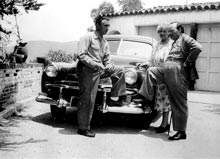 |  | 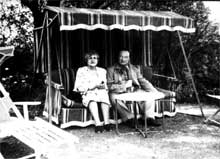 | | | | | | Alma with her butler August Hess, Franz Werfel and their new car outside the house in Los Tilos Road, 1941 | | Alma and Franz Werfel in the garden of their house in Los Angeles, 1941 | The couple's financial resources were sufficient to allow them to settle in an elegant residential area above the city at 6900 Los Tilos Road, and even to engage August Hess, who worked simultaneously as valet, chauffeur and gardener. Werfel worked industriously on the novel about Bernadette Soubirous. This work - "The Song of Bernadette" - became a US best-seller, and sold 400,000 copies within just a few months. 20th Century Fox acquired the film rights. Reviews appeared in numerous American daily newspapers, and radio interviews with Werfel were broadcast throughout the country. 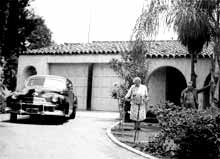 |  | 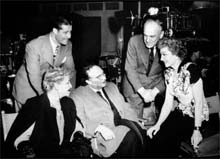 | | | | | | Alma and Werfel in front of their house in Los Tilos Road, 1941 | | Alma and Werfel on the set of "Midnight" (1939), with Claudette Colbert and Don Ameche (Director: Mitchel Leisen) | Werfel's secretary Albrecht Joseph, later to be Anna Mahler's husband, reported a characteristic experience from this period: "One morning when I came to The Outpost for our day's work on “Bernadette” I was plunged into just such a situation. The quarrel was about the news, which were, as usual, pretty bad. Alma took the position that it could not be otherwise since the Allies - America was not in the war yet - were weaklings and degenerate, the Germans, including Hitler, supermen. Werfel did not let this nonsense pass but Alma would not yield. The pointless quarrel went on for about ten minutes, then Werfel clapped me on the shoulder and said: “Let's go downstairs and work.” In the middle of the narrow winding staircase, the chicken ladder, he stopped, turned around to me and said, with a tinge of real sorrow: “What is one to do with a woman like that?” It sounds rather good-natured but there was not a trace of humour in his voice. He was desperate. I tried some feeble explanation. He shook his head: 'One just has to remember that she is an old woman.' " 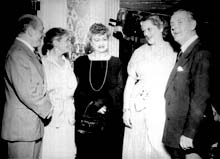 |  | 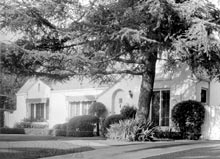 | | | | | | Alma with Thomas Mann and Eugene Ormandy after a performance of Mahler's 8th Symphony at the Hollywood Bowl in July 1948 | | The house at 610 Bedford Drive, Beverly Hills, where Alma and Werfel moved in September 1942 | The improvement in the couple's financial circumstances resulting from Werfel's success as a novelist enabled them to buy a more comfortable villa in Beverly Hills, at 610 Bedford Drive, where the conductor Bruno Walter would later become their neighbour. Werfel often retreated to Santa Barbara to work, a geographical separation which enabled the couple to retain common ground despite the massive differences between them, and to keep the relationship stable over 25 years. 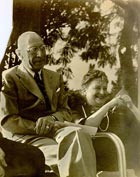 |  | 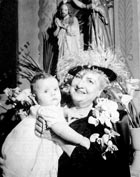 |  | 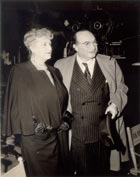 | | | | | | | | Alma with Igor Stravinsky in Los Angeles, 1946 | | Alma with her godchild, Erika, daughter of Walter Slezak, 1945 | | Alma with Franz Werfel on a film set in Hollywood, 1943 | Not far from the new villa lived not only Friedrich Torberg, but also the actor Ernst Deutsch, a friend of Werfel's from his youth, the composer Arnold Schönberg and his wife, and Lion Feuchtwanger and his wife. Author Erich Maria Remarque became Alma's drinking companion; after the first time they partied through the night, he gave her a bottle of Russian vodka hidden in a huge bunch of flowers. During the night of 13 September 1943, Franz Werfel suffered a massive heart attack, from which he only gradually recovered during the first half of 1944. In the summer of 1945 he was just completing his utopian novel "Star of the Unborn" when his state of health dramatically worsened. On 26 August 1945, he suffered a further, fatal heart attack. Alma herself did not attend the funeral. Father Georg Moenius gave the eulogy; in his address he went into the baptism rites of the Catholic church in great detail, which led to speculation that Alma had arranged for Werfel to have a last minute "emergency baptism" after his death. Franz Werfel left behind on the one hand an extensive body of work, which Alma now embarked on organizing, and on the other hand a "Grande Veuve", who increasingly tried to overcome her loneliness with the help of her favourite cognac, Bénédictine. > next: La Grande Veuve (1945 - 1964)
< back: Heaven and hell (1911 - 1917) | |
